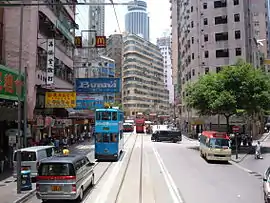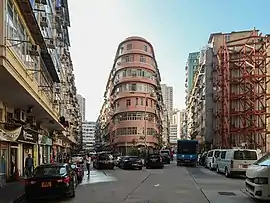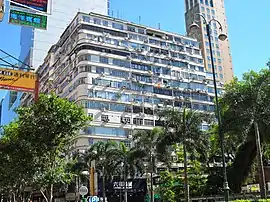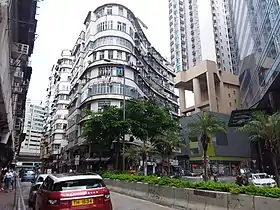
On Cheung Building at the intersection of Public Square Street and Nathan Road
Corner Houses (Chinese: 街角樓) are a type of building located at the junction of two or three roads.
Hong Kong

Corner houses are buildings located at junctions. In Hong Kong, buildings must meet certain specifications, which is why corner houses are so common on Hong Kong Island and Kowloon.
Corner houses originate from the Composite Buildings of Hong Kong. They were popularized in the 1950s and the 1960s. Most corner houses are fourth-generation tong lau, featuring rounded corners and lines.
Antonio Hermenegildo Basto currently holds the record for the most corner buildings designed in Hong Kong.[1][2]
Locations

Eiver House in To Kwa Wan
Hong Kong Island: Wan Chai, Causeway Bay, Sai Ying Pun, Shau Kei Wan
Kowloon: Sham Shui Po, Mong Kok, Tai Kok Tsui, To Kwa Wan, Cheung Sha Wan

Kingland Apartments in Nathan Road and Bute Street.
Styles
Types

Haiphong Mansion
 90° Corner(43-49 Bute Street)
90° Corner(43-49 Bute Street) Acute corner (less than 90°) in Cheung Ling Mansion.
Acute corner (less than 90°) in Cheung Ling Mansion. Multilateral Corner (Wanchai Building)
Multilateral Corner (Wanchai Building) Wavy Corner(Peony House)
Wavy Corner(Peony House) 180° Corner(Chung Wui Mansion)
180° Corner(Chung Wui Mansion) Obtuse Corner (less than 180°) (148 Austin Road)
Obtuse Corner (less than 180°) (148 Austin Road)
Notable buildings
Hong Kong
- 14 Nam Cheong Street (Boundary Street and Nam Cheong Street)
- May Wah Building (Wan Chai Road and Johnston Road
- Mido Cafe (Temple Street and Public Square Street
- New Lucky House (Nathan Road and Jordan Road)
- Chung Wui Mansion (Wan Chai Road, Fleming Road, and Johnston Road)
- Hing Wah Mansion (Babington Path, Park Road, St Stephen's Lane, and Oaklands Path)
Taiwan
United States
UK
- The Cornerhouse, Nottingham
- Cornerhouse (Demolished)
See also
References
- ↑ 吳韻怡 (2015-08-08). "同德大押歷史研究報告" (PDF). 古物諮詢委員會. Archived (PDF) from the original on 2019-10-26. Retrieved 2018-08-20.
- ↑ Dewolf, Christopher (2019-10-31). "Corner buildings Hong Kong's Modern Heritage, Part X". Zolima City Magazine. Retrieved 2021-09-11.
- ↑ 邵超 (2013-02-27). "一樓一古:半世紀發水史". 蘋果日報. Archived from the original on 2018-08-19. Retrieved 2018-08-19.
Further reading
- Michael, Wolf (2010). Hong Kong corner houses. Hong Kong University Press. ISBN 978-988-8028-72-6. Archived from the original on 2021-07-24. Retrieved 2021-12-19.
External links
- Piece of Hong Kong's History: Composite Buildings》 Archived 2018-08-20 at the Wayback Machine
This article is issued from Wikipedia. The text is licensed under Creative Commons - Attribution - Sharealike. Additional terms may apply for the media files.
_edit.jpg.webp)